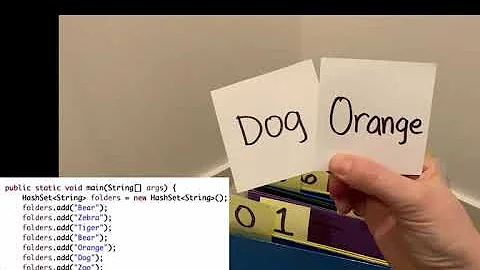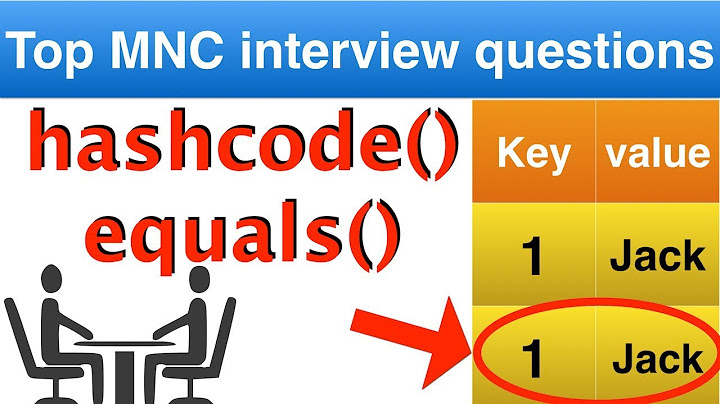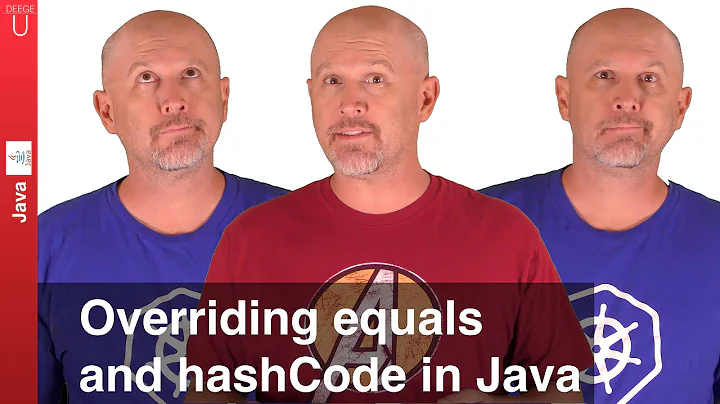Hashcode and Equals for Hashset
Solution 1
- There's no need to call
equalsifhashCodediffers. - There's no need to call
hashCodeif(obj1 == obj2). - There's no need for
hashCodeand/orequalsjust to iterate - you're not comparing objects - When needed to distinguish in between objects.
Solution 2
I think your questions will all be answered if you understand how Sets, and in particular HashSets work. A set is a collection of unique objects, with Java defining uniqueness in that it doesn't equal anything else (equals returns false).
The HashSet takes advantage of hashcodes to speed things up. It assumes that two objects that equal eachother will have the same hash code. However it does not assume that two objects with the same hash code mean they are equal. This is why when it detects a colliding hash code, it only compares with other objects (in your case one) in the set with the same hash code.
Solution 3
according jdk source code from javasourcecode.org, HashSet use HashMap as its inside implementation, the code about put method of HashSet is below :
public V put(K key, V value) {
if (key == null)
return putForNullKey(value);
int hash = hash(key.hashCode());
int i = indexFor(hash, table.length);
for (Entry<K,V> e = table[i]; e != null; e = e.next) {
Object k;
if (e.hash == hash && ((k = e.key) == key || key.equals(k))) {
V oldValue = e.value;
e.value = value;
e.recordAccess(this);
return oldValue;
}
}
modCount++;
addEntry(hash, key, value, i);
return null;
}
The rule is firstly check the hash, then check the reference and then call equals method of the object will be putted in.
Solution 4
You should read up on how to ensure that you've implemented equals and hashCode properly. This is a good starting point: What issues should be considered when overriding equals and hashCode in Java?
Solution 5
Because in 2nd case you adding same reference twice and HashSet have check against this in HashMap.put() on which HashSet is based:
if (e.hash == hash && ((k = e.key) == key || key.equals(k))) {
V oldValue = e.value;
e.value = value;
e.recordAccess(this);
return oldValue;
}
As you can see, equals will be called only if hash of key being added equals to the key already present in set and references of these two are different.
Related videos on Youtube
Lolly
Updated on March 10, 2020Comments
-
Lolly about 4 years
Please clarify my doubt in Hashset. Consider the following code,
class Person { String name; Person(String n) { name=n; } public String getName() { return name; } @Override public boolean equals(Object arg0) { System.out.println("in equals"); Person obj=(Person)arg0; System.out.println("1st "+getName()); System.out.println("2nd "+obj.getName()); if(this.getName().equals(obj.getName())) { return true; } return false; } @Override public int hashCode() { System.out.println("in hash code"); System.out.println(" value is "+Integer.valueOf(name.charAt(0))); return Integer.valueOf(name.charAt(0)); } }in main I have the following code
Person obj1=new Person("bcd"); Person obj2=new Person("cde"); Person obj3=new Person("abc"); Person obj4=new Person("abc");Now if I add these objects to hashset
Set<Person> sset=new HashSet<Person>(); sset.add(obj1); sset.add(obj4); sset.add(obj2); sset.add(obj3);I am getting this output
in hash code value is 98 in hash code value is 97 in hash code value is 99 in hash code value is 97 in equals 1st abc 2nd abcQuestion 1 : why equals() function is called only once for checking obj3 and obj4 ? Why its not checked for rest of the objects ?
Question 2 : If the answer is because they both have same hash code,only then equals will be called, then why its not called for below code
sset.add(obj1); sset.add(obj4); sset.add(obj2); sset.add(obj4);output is :
in hash code value is 98 in hash code value is 97 in hash code value is 99 in hash code value is 97It's not going inside equals() method even though two same objects are added to hash set which has same hash code.
Question 3 :I iterated the above value and printed the contents but neither hashcode nor equals were called. when its really useful to override hashcode and equals method ?
Question 4 : When will
hashCode()andequals()be called?-
 Daniel about 13 yearsMmh... do I read this question without code formatting?... Do I format it mayself to understand it?... no, its late, I go home. N8.
Daniel about 13 yearsMmh... do I read this question without code formatting?... Do I format it mayself to understand it?... no, its late, I go home. N8. -
Erik about 13 years@Paŭlo Ebermann: Please don't change the meaning of an answer when you edit - it was worded using "hashCode" and not "equals" in 2. intentionally. You're free to write a new answer if you disagree with mine.
-
Paŭlo Ebermann about 13 years@Erik: Sorry, since the question was about calling
.equals, I thought the answer should be about this too. (Yes, you are right, I should have added a comment instead.)
-
-
David Harkness over 12 years
HashMapactually calculates the hash to find the correct bucket and uses it before comparing object identity with==or callingequals(), but otherwise this is correct.equals()isn't called in the second example because==already detected the duplicate. -
Pramod Kumar almost 12 yearsThere's no need for hashCode and/or equals just to iterate - you're not comparing objects --- Then how would it get the current bucket if it don't call hashcode in iteration?





![Equals and Hashcode Contract in Java [Important Java Interview Question] | Code Decode](https://i.ytimg.com/vi/4X5Kgi2VltI/hq720.jpg?sqp=-oaymwEcCNAFEJQDSFXyq4qpAw4IARUAAIhCGAFwAcABBg==&rs=AOn4CLCL7jd9qNEpTh9TtDnW8bY6JvSbzg)
